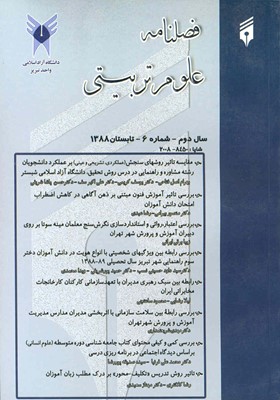تاثیر روش تدریس «تکلیف-محور» بر درک مطلب زبان آموزان
محورهای موضوعی : روانشناسی تربیتی
1 - پژوهشگر پژوهشگاه مطالعات آموزش و پرورش
2 - استادیار دانشگاه آزاد اسلامی واحد تبریز
کلید واژه: درک مطلب, روش تدریس تکلیف- محور, دانش ارتباطی,
چکیده مقاله :
خواندن و درک مطلب یکی از موارد اساسی و مهم برای دریافت معنی از متن می باشد. تاکید بر مهارت خواندن فراگیران زبان های خارجی یکی از مهمترین موضوعات متدولوژی در زمینه آموزش زبان است. یکی از مشکلات فراگیران ایرانی عدم تمایل آنان در مواجه با تعامل با متن های خواندن و درک مطلب می باشد، در حالی که بیشتر متون انگلیسی در ایران بر اساس خواندن و درک مطلب طراحی شده اند. برای اینکه مهارت خواندن نقش اساسی در یادگیری زبان دوم داراست. اما کلاس های خواندن متون انگلیسی برای دانش آموزان خسته کننده به نظر می رسد در حالی که بیشتر دانش آموزان علاقمند اند موقعیتی پیدا کرده تا توانایی خودشان را نشان دهند و به سوالات معلّم جواب دهند. لذت بخش نبودن کلاس ها به علّت عدم آگاهی معلّمان از روش های صحیح تدریس خواندن و درک مطلب زبان انگلیسی می باشد.. تدریس زبان دوم با استفاده از روش تکلیف-محور یک روش موثر در بهبود دانش زبانی و درک مطلب فراگیران شناخته شده است. هدف تحقیق حاضر تعیین تاثیر تدریس فعالیت های آموزشی در قالب تکلیف-محور بر درک مطلب زبان آموزان ایرانی بوده است. جامعه آماری پژوهش 60 نفر فراگیر زبان انگلیسی از آموزشگاه خصوصی بوده است. با توجه به حجم کم جامعه صدرصد جامعه به عنوان نمونه انتخاب گردید. سپس نمونه آماری به دو گروه مساوی؛ گروه کنترل وآزمایش تقسیم شدند. یک گروه با روش های سنتی تعلیم داده شده و گروه دیگر با استفاده از تدریس فعالیت تکلیف محور تعلیم داده شد. تحلیل آماری مطالعه نشان داده است که بین دوعملکرد گروه ها تفاوت معنی داری وجود دارد.
The ability to read in a second language is one of the most important skills required of people in multilingual and international settings. The main Purpose for reading can include reading for comprehension. Emphasis on reading ability of foreign language learners has come to be one of the most important methodological topics in the field of English to speakers of other languages, because it is considered a significant tool in leaning all academic subjects. One of the major problems is Iranian students' unwillingness in involving with reading texts, while most of the English textbooks are reading based in Iran. Reading classes seem boring for students. This is due to teachers' unawareness of making language classes meaningful and therefore enjoyable for students. Task-based language teaching is an effective methodology for improving learners' linguistic and communicative competence. This study has investigated the effect of task-based activities on EFL learners' reading comprehension. In order to accomplish the research, 60 students were chosen from a private Institute. A pre-test including 60 TOFLE questions was given to the participants. According to the pre-test, the participants were divided into two groups, namely experimental and control groups. The experimental group was taught according to the elements of task-based learning but the control group didn't receive such treatment. After 15 sessions a post test was given. Through the analysis of the obtained data, t-test, it was found that there were significant differences between control and experimental group on dependant variable, reading comprehension.
- هالاهان، دانیلپی و کافمن، جیمزجی (1371)؛ کودکان استثنایی، ترجمه فرهاد ماهر، تهران، رشد، چاپ اول.
- Alderson, Charles J. & Urquhart, A.H. (1984), Reading in a foreign language. NewYork; Longman.
- Anderson, L. W. (1989), The effective teacher: Study guide and reading. Random NewYork House.
- Ellis. R. (2004), Task-based Language Learning and Teaching. OxfordUniversity Press.
- Nunan. D. (1988), Syllabus Design. OxfordUniversity Press
- Kirn, E., & Hartmann, P. (2002), Interactions reading. (4th Ed.), Los AngelesCollege: Mc Graw.Hill Contemporary.
- Nunan, D. (1989), Designing Tasks for the Communicative Classroom. New York: CambridgeUniversity Press.
- Papalia, A. (1987), Interaction of reader and text. In W. M. Rivers (Ed.), interactive Language Teaching (pp.70-82). Cambridge: CambridgeUniversity Press.
- Widdowson, H. G. (1990), Aspects of Language Teaching. OxfordUniversity Press.
- Willis, J. (1996), A Framework for Task-based Learning. London: Longman


